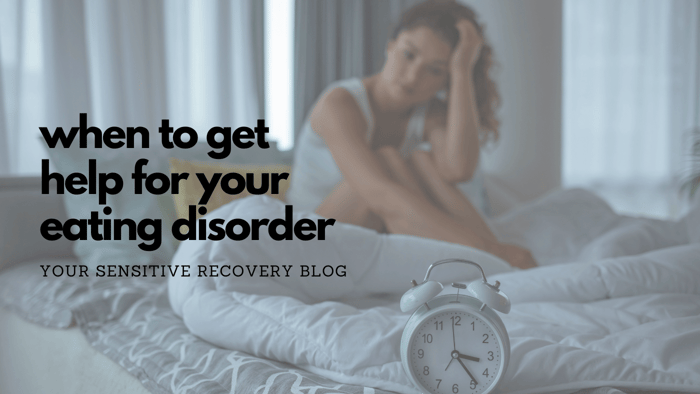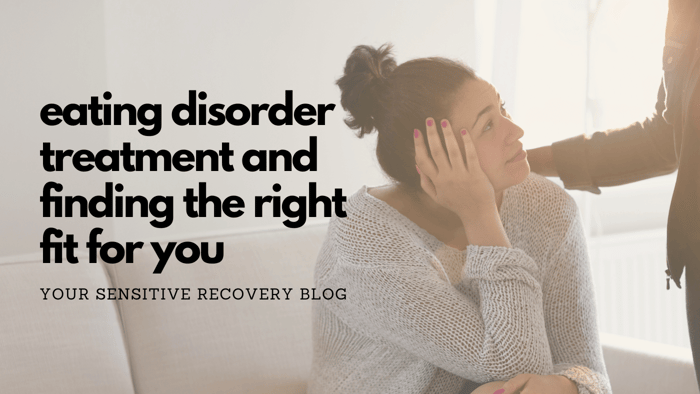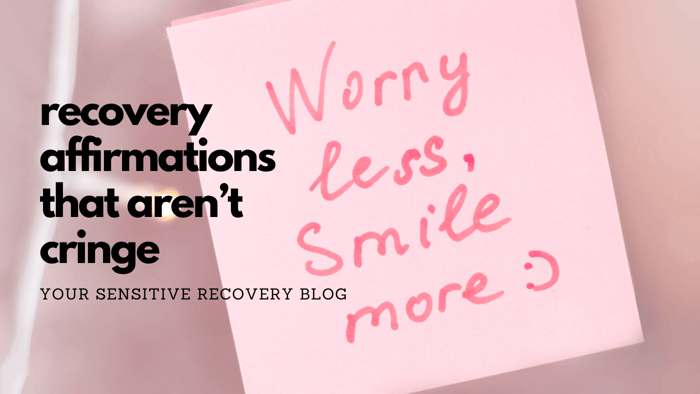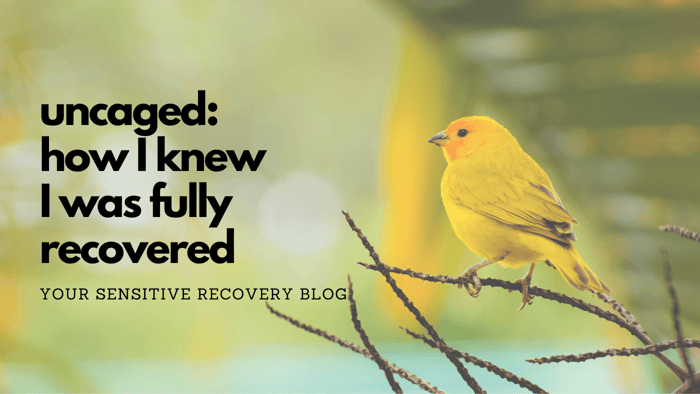Recognizing you have an eating disorder and admitting you need help can be a daunting and overwhelming experience. Eating disorders are serious, complex mental health conditions that affect millions of people, of all ages, genders, and backgrounds. They can go unnoticed and unaddressed for years, leading to severe physical, mental, and emotional consequences.
Understanding when to seek help is crucial.
In this blog post, I'll explore early intervention for eating disorders, some signs that your relationship with food or your body is in trouble, and some of the barriers that can delay people from reaching out. If this post is a wake-up call for you, I'll also share some resources at the end to help you find the support and treatment you need.
Getting help is a courageous and vital step toward healing. You're worth it.
From Diet to Disorder: Is There A Problem?
When someone falls down the rabbit hole into eating disorder territory, it's often by tripping over a very thin, very subjective line. Here's what I mean:
In the Diagnostic and Statistical Manual, there's a line amongst the diagnostic criteria that states symptoms "cause clinically significant distress or impairment in social, occupational, or other important areas of functioning." This is where it gets tricky. First of all, subjective. Second, someone with a severe eating disorder may report little to no distress from it.
Usually, deep down, a person knows that their relationship with food or their body is causing significant dis-ease, but denial can run incredibly deep in a malnourished mind.
When I'm assessing new therapy clients for disordered eating, if things are unclear, one of the questions I may ask is this: If you could snap your fingers and things would be immediately, miraculously different, what would you want to change about your relationship with food, exercise, or your body? This "miracle" question often illuminates immense pain in the present.
Are there beliefs or behaviors related to food, exercise, or your body that are depleting your energy? Causing you to miss out on important things in your life? Isolating you? Increasing feelings of depression or anxiety? Making you feel trapped and out of control?
If yes, there is a problem...and it's worth addressing.
Sick Enough: The Waiting Game
It may think it goes without saying, but this is going to matter to someone, somewhere: You do not need an eating disorder diagnosis to get help for your food and body image struggles. If you want to use insurance benefits for therapy or a treatment program, a diagnosis will be required, but to simply get the assessment part going, you do not need an official diagnosis of any kind.
Getting to the point of being "sick enough" to warrant help is a construct created by the eating disorder. It's also a point you will never reach, not by its standards at least.
The truth is that all eating disorders have the potential to be deadly, at any weight, after any length of time. They not only create physical issues but can complicate and exacerbate ones that individuals may not even know they have.
This isn't about scaring you.
Medical consequences typically are not enough to push someone into treatment, and that fact really speaks to the severity and complexity of the disorders themselves.
I just want to be clear that waiting until you feel "sick enough" is a deadly game you cannot win. If you need help challenging the thought that you aren't sick enough to get help, check out my post here.
Sooner Rather Than Later
The longer an eating disorder exists unchecked, the more embedded it can become in a person's psyche.
In a recent post, I touched on the four stages of eating disorder development as described by psychotherapist Stephen Levenkron. Briefly, they are 1. Achievement (behaviors, especially in the beginning, can bring about feelings of worth, satisfaction, and esteem), 2. Security (turning toward an eating disorder rather than supporters), 3. Secondary gains (amassing indirect benefits from the illness), and 4. Identity (embracing the role of an "eating-disordered-person").
As coping tools, eating disorders can offer relief, structure, escape, distraction, and many other things. As individuals "benefit" from this form of coping, eating disorders begin to feel more and more necessary and more and more worth holding onto and protecting.
I sometimes hesitate to discuss how studies show that early intervention is associated with better treatment outcomes. While it's true, I don't want people who have struggled for years to misunderstand this and think there is no hope for them.
I've worked with amazing humans who struggled for years with their eating disorders and were able to recover. So please hear that.
Taking Action
If you're considering taking action and reaching out for help with any eating disorder - way to go! Amazing. It is totally normal for your motivation to wax and wane though. In fact, you're likely to feel intense regret after reaching out for the first time. That's ok.
Feelings aren't always facts. Just because you feel regret about reaching out doesn't mean you've done something wrong. Your eating disorder self is just frightened.
Start by talking to a trusted loved one. If you want help seeking treatment, ask for it. You can also speak to your primary care physician about wanting help for your relationship with food, exercise, and/or your body. They will likely run some labs and tests and then give you some referrals for psychotherapy or nutrition therapy that will be good places to start.
It's important to work with someone who specializes in eating disorder treatment. Most licensed professionals get very little education on how to properly address and treat these issues. Specialists have specific training and experience that will go a long way in helping you stay safe, feel heard, and make progress in your healing.
Remember, seeking help is a brave and important step toward recovery. You deserve support, understanding, and the opportunity to lead a fulfilling life free from the grips of an eating disorder. By taking action now, you can pave the way for a healthier, happier future. Check out some of the resources below to get started. 💕
Resources
Websites:
National Eating Disorders Association (NEDA)
Academy for Eating Disorders (AED)
Eating Disorders Anonymous (EDA)
National Association of Anorexia Nervosa and Associated Disorders (ANAD)
Psychology Today Therapist Finder
Open Path Collective (Low Fee Therapy Finder)
Helplines:
ANAD: 1-888-375-7767
NEDA: 1-800-931-2237 or text NEDA to 741741
Beat (UK): 0808 801 0677
SEED (UK): 01482 718130
Butterfly Foundation (Australia): 1800 33 4673
Eating Disorders Victoria (Australia): 1300 550 236
Financial Assistance Programs:
Kirstin Haglund Foundation
Moonshadow's Spirit
Project Heal
WithAll
✨ Josie Munroe, LMFT is a licensed therapist and owner of JosieMunroe.com and Your Sensitive Recovery As a recovered clinician and Highly Sensitive Person, she loves supporting others on their journeys to form new, empowered relationships with food, their bodies, and their sensitivity. Join the newsletter for a weekly boost of hope and inspiration. You deserve a recovery that works for you! ✨





